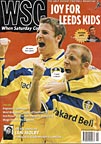 Having guided Pachuca to their first Mexican title, Javier Aguirre is affecting the world of politics as well. Simeon Tegel reports
Having guided Pachuca to their first Mexican title, Javier Aguirre is affecting the world of politics as well. Simeon Tegel reports
In a sport where most professionals have no interest in politics or come from the Alf Garnett school of social justice, Javier Aguirre stands out. After coaching Mexico’s oldest club, Pachuca, to its first league title in December, the former international lost no time in reminding the country of his leftwing views.
A fervent trade unionist and supporter of the indigenous Zapatista movement in the southern state of Chiapas, Aguirre said: “I wouldn’t regard myself as a revolutionary but I am a person who is committed to certain values. We can all see there are huge discrepancies in income, brutal injustices, a poverty which offends and hurts.”
Those words must have been music to the ears of the struggling opposition in a country where football is a national obsession but where less than one per cent of the population buys a daily newspaper. A dynamic midfielder who scored 26 goals in 86 games for the national side, Aguirre, now 41, is well positioned to put forward his views.
In May 1991 he became the founding president of Mexico’s now near-defunct Football Professionals’ Association, campaigning for fairer treatment for players. More recently, he was invited to take part in talks over the San Andrés accords, aimed at solving the conflict in Chiapas, where the Zapatistas and the national army have reached an uneasy and heavily armed stand-off.
“For some reason the Zapatista team chose me as their spokesman at one of the negotiating tables. I was unable to attend but I feel close to them and would like to help them in any way I can,” Aguirre told WSC.
Aguirre was heavily influenced by César Luis Menotti, the lanky leftwing intellectual who nevertheless delivered the World Cup to the Argentinian junta in 1978. Menotti, who went on to coach Mexico, is also famous for his insistence on a stylish form of thoughtful but flowing football.
However, Aguirre’s triumph with Pachuca borrowed as much from the Egil Olsen school as it did from Menottismo, a necessity, perhaps, given the lack of any star players at his disposal at the small town club, 60 miles north-east of Mexico City. The team’s sharpest talent, Lombardo-lookalike Pablo Hernán Gómez, was previously best known for being Argentina’s youngest balding professional.
Under Mexico’s complicated league system, the top division of 18 teams is split into four groups while each campaign is divided into summer and winter seasons. The winners and runners up of each group go into the Liguilla, a knock-out phase of two-legged ties. However, the winners do not even earn the right to play in the Copa de Libertadores, thanks to the rules established at the behest of Televisa, the broadcasting giant which owns three top flight sides – including América, the richest club in the country.
Instead, the rights for Mexican teams to play in Latin America’s equivalent of the European Cup are sold to the highest bidders, invariably including América, who were this year knocked out of the Liguilla in the semi-finals. Pachuca’s status as underdogs did not stop them beating the reigning champions Toluca in the quarter-finals and then knocking out Atlas of Guadalajara, widely regarded as Mexico’s best side.
The first leg of the final, against Mexico City’s Cruz Azul, at Pachuca’s windy, 24,000-capacity Hidalgo Stadium, ended in a 2-2 draw, once again leaving almost all pundits predicting the giantkillers’ demise. But, in a largely forgettable game at the Estadio Azul, Pachuca’s nervous eight-man defence effectively stubbed out every wave of the Cruz Azul attack during a scoreless normal time. To the relief of neutral observers, the final was eventually brought to an end in the first minute of extra time with a golden goal by the Argentinian forward Alejandro Glaría.
Aguirre’s success at the club is unprecedented. Founded by Cornish miners in November 1900, Pachuca had never previously even reached the Liguilla. Now, with the Winter 99 trophy glinting in his locker, Aguirre is talking about an even more ambitious undertaking –‑helping the Zapatistas’ leader, Subcomandante Marcos, negot- iate an end to the Chiapas conflict.
“I would love to help,” he said. “Of course, it is not good for our country that there exists a group of people so marginalised, while at the same time others have so much power.”
From WSC 156 February 2000. What was happening this month